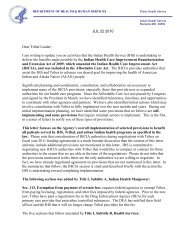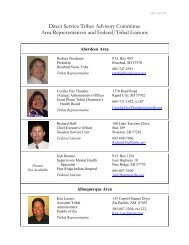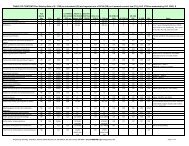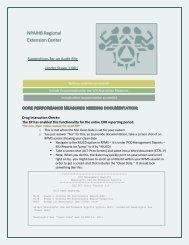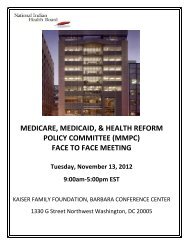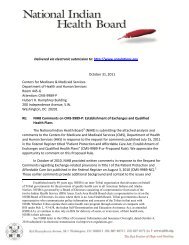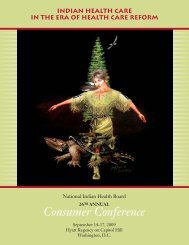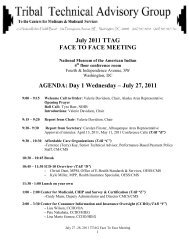âHealth Insurance Premium Tax Creditâ (IRS REG-131491-10)
âHealth Insurance Premium Tax Creditâ (IRS REG-131491-10)
âHealth Insurance Premium Tax Creditâ (IRS REG-131491-10)
- No tags were found...
You also want an ePaper? Increase the reach of your titles
YUMPU automatically turns print PDFs into web optimized ePapers that Google loves.
NIHB Analysis of Proposed Rule: Health <strong>Insurance</strong><strong>Premium</strong> <strong>Tax</strong> Credit (<strong>IRS</strong> <strong>REG</strong>-<strong>131491</strong>-<strong>10</strong>)It is important to note that, pursuant to the Affordable Care Act, cost-sharing assistanceis not dependent upon eligibility for premium tax credits (or vice versa.) 48 And as discussedearlier in these Comments, eligibility for enrollment in a health plan in the individual marketthrough an Exchange is not dependent on eligibility for either premium tax credits or costsharingreductions. Eligibility for premium tax credits and cost-sharing assistance is, though,dependent upon enrollment in a health plan in the individual market through an Exchange.NIHB recommends that the preamble to the final rule emphasize this point and that <strong>IRS</strong>and CMS include the list of eligibility requirements in educational materials that they mayproduce together or separately. The ACA is difficult for experts to parse through andlaypeople are truly overwhelmed. Simple statements like that above can be helpful inassuring that everyone understands where there is an opportunity for them to benefit.8.2 Excess Payment of Cost-sharing Assistance (§§ 1402 and 1412)NIHB requests that <strong>IRS</strong> and HHS clarify that any payments of cost-sharing assistanceprovided under § 1402 and provided to AI/AN specifically under § 1412 that may besubsequently evaluated to be in excess of the amount an individual is eligible to receive willnot be required to be paid by the enrollee.For purposes of any “overpayments” of cost-sharing assistance, the Secretary shouldconsider any cost-sharing reduction payment allowed under section 36B that is madepursuant to §§ 1402 or 1412 to be treated as made to the qualified health plan in which anindividual is enrolled and not to that individual. As such, an individual would not berequired to compensate an Exchange or the <strong>IRS</strong> for any overpayment of cost-sharingassistance that may be provided. Similar language is used at 42 U.S.C. 18084 pertaining tothe exclusion of this assistance in determining eligibility for Federal and Federally-assistedprograms, as authorized under § 1415 of the ACA.9. Information Reporting by Exchanges (§ 1.36B-5)Under § 1.36B-5(b) “Time and manner of reporting,” NIHB recommends thattaxpayers should be able to go to the Exchanges at any time (electronically or in-person)and print out a record of the tax credits that they have received. Exchanges should alsohave a simple way to recalculate premiums and tax credits for people whose circumstanceschange and for people who stop their insurance or re-enroll in Exchange coverage. Forexample, if an AI/AN enrolls, disenrolls, and later reenrolls in health plans offered throughan Exchange as permitted during the Special Enrollment periods 49 , the individual’s taxcredits should be recalculated by the Exchange and a running total of advance paymentsmade should be available to the taxpayer and <strong>IRS</strong> at any time. The Exchange should be able48In fact, in subtitle E, Part I, subpart A ―<strong>Premium</strong> <strong>Tax</strong> Credits and Cost-sharing Reductions‖, there arerepeated references to, for example, ―eligibility and amount of tax credit or reduced cost-sharing‖ (ACA §1411(a)(1); emphasis added).49ACA§ 1311(e)(6)(D).National Indian Health Board Page 22 of 23 October 31, 2011



